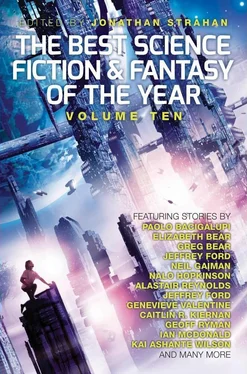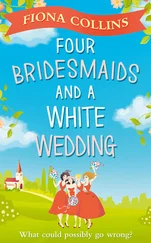“I’m not a hobo,” Dancy says. “I don’t hitchhike, either. And it’s not a knapsack, it’s a duffel bag. It was my great grandfather’s duffel bag, when he fought in World War II. He fought the Germans in the Argonne Forest in 1918, and this was his duffle bag.”
They’ve come to a small clearing near a stream, a place where the trees and vines have left enough room for the sun to reach the ground. Dancy asks the girl to please let go of her, and the girl does. Once again, Dancy looks back towards the road and the dragon. There’s a mounting sense that all of this is wrong, that she hasn’t done what she was meant to do back there. She doesn’t run from the monsters; she doesn’t ever run.
The air here is hot and still. It smells like pine sap and cicadas. The air here smells hot, and Dancy imagines that, rain or no rain, one careless match would be enough to set the world on fire. She drops her heavy duffel bag onto the ground, slips the knife back into her waistband, and looks about her. “Who are you, anyway?” she asks the girl.
“Who are you?”
“I asked first,” Dancy replies.
The girl who dragged her into the forest, away from the boomerangheaded dragon, shrugs, and alright, she says, whatever. “My name’s Jezzie, Jezzie Lilligraven.”
“Jessie?”
“No, Jezzie, ” says the girl. “With z’s. It’s short for Jezebel.”
Dancy turns her attention back to the clearing. There’s a big wooden packing crate near the center, and a door and window has been cut into the side facing her. The wood is emblazoned with MAYTAG, and THIS END UP, and a red arrow pointing heavenward. There’s a piece of pale blue calico cloth tacked over the window and there’s a door made from corrugated tin. There aren’t any hinges; it’s just propped in place.
“That’s sort of an odd name,” Dancy says, glancing up at the sky, because the dragon might have followed them. “Who’d name their daughter after Jezebel? She was an evil woman who worshipped Baal and persecuted the prophets of God and his people. She was thrown from a window and fed to wild dogs by Jehu for her sins. Who would name their daughter after someone like that?”
The girl stares at Dancy a moment, rolls her eyes, then heads for the wooden packing crate.
“Yeah, so what’s your name, Little Miss Sunshine, and, by the way, you’re very welcome.”
“Dancy. My name is Dancy Flammarion. And very welcome for what?”
The girl lifts the corrugated tin and sets it aside, leaning it against the outer wall of the crate. Dancy thinks it looks cool in there, within the arms of those shadows.
“Dancy Flammarion? That’s your name?”
“Yeah. So?”
The girl shakes her head and steps into the packing crate, vanishing from view. Dancy can still hear her, though.
“Just, with a name like that, I wouldn’t be ragging on anyone else’s. Ever heard of throwing rocks in glass houses?”
“It’s a town up in Greene County,” Dancy says. “My grandmother was born in Dancy, so my mother named me Dancy.”
“You gonna stand out there or what?” the girl says from inside the packing crate.
“Well, you haven’t invited me in.”
There’s a pause, and then, with an exaggerated politeness, the girl says “Dancy Flammarion, would you like to come inside?”
“Yeah,” Dancy says, checking the sky one last time.
It isn’t as cool inside the crate as she’d hoped, but it’s cooler than it had been inside the abandoned Western Railway of Alabama boxcar. There’s a threadbare rug covering the floor, a rug the color of green apples; there’s a cot set up at one end of the crate and a folding aluminum card table at the other. There’s a blue blanket at the foot bed, neatly folded, and a pillow. Books are stacked under the cot and along the walls. On the table, there’s a box of graham crackers and another box of chocolate moon pies. There are also two cans of pork and beans. Beneath the table is a styrofoam cooler and a plastic jug of water.
“You live here?” Dancy asks, eyeing the water jug, aware now just how parched her mouth and throat is.
“No,” the girl replies. “ I’m not a hobo. I live down on Parish Road, close to Fort Rucker. That’s an Army base.”
“I’m not a hobo. I done told you that already.”
“Says you. You’re the one out hitchhiking with a knapsack.”
Dancy frowns and looks around the crate again.
“All these books yours?”
“Yeah,” the girl says. “They were my granddad’s, and now they’re mine. My daddy was gonna throw ’em all out, but I saved them. You can have a seat on the cot there, if your britches ain’t too wet and if they ain’t muddy.”
Dancy pats the butt of her jeans, decides they probably are too damp to be sitting on anyone’s bed, and so she settles for a place on the rug, instead.
“It’s nice in here,” Dancy says.
“Thank you,” says Jezzie Lilligraven. “This is where I come to be alone and think, to get away from my brothers and just be by myself.”
“Well, it’s nice,” Dancy says again. Then she notices something else on the floor, something else spaced out here and there along the walls of the packing crate, between the stacks of books – there are pint Mason jars and big two and three big quart jars that might once have held dill pickles or pickled eggs or pickled pig’s feet, but now they’re filled with clear liquid and dead things. Dancy looks at Jezzie and then back at the jars. The one nearest Dancy has a big king snake, black coils and links of cream-colored scales, and the one next to it holds a baby alligator.
“That’s my herpetology collection,” Jezzie says, before Dancy has a chance to ask, and then the girl picks up a yellow and pink waffle-weave dishrag and wipes the sweat off her face.
Dancy looks up at her. “Your what?” she asks.
“It’s the study of reptiles and amphibians. Herpetology. ”
“You keep dead things in jars?”
“So I can study them. I caught them myself, and I used rubbing alcohol to preserve them. It ain’t so good as formalin, but where am I gonna get that?”
Dancy rubs at her eyes, which feel at least as dry as her throat.
“You want something to drink?” Jezzie asks, like maybe the girl can read her mind. “I got water, and I got water. But it’s good sweet water, right from our well.”
“Yes, please,” Dancy replies, and Jezzie opens the plastic jug and fills a jelly glass halfway full.
“Now, don’t drink it too fast,” she says. “You’ll get cramps. You might throw up, if you drink it too fast.”
You think I don’t know not to gulp water when I’m this hot and thirsty? she wants to say. You think I don’t know no better? But she keeps the thoughts to herself and sips the water in the jelly glass.
“I like to think one day I’m gonna go away to college,” Jezzie tells her. “I won’t, cause we don’t have the money, and my grades ain’t good enough for no scholarship. But I like to think it, anyway. I have my granddad’s books – like you’ve got your great granddad’s knapsack – and I teach myself everything I can. I don’t have to be ignorant, just cause my family can’t afford college. I might just wind up working at the Wal-Mart or my auntie’s BBQ place, but I don’t have to be ignorant.”
“Keeping snakes in jars, you think that makes you smart?” Dancy asks, and she leans a little nearer the jar with the king snake. Its dead eyes are a milky white. She sets her glass down, picks up one of the books, and she reads the cover aloud – Prehistoric Life by Percy E. Raymond, Third Printing, Harvard University Press.
Читать дальше












